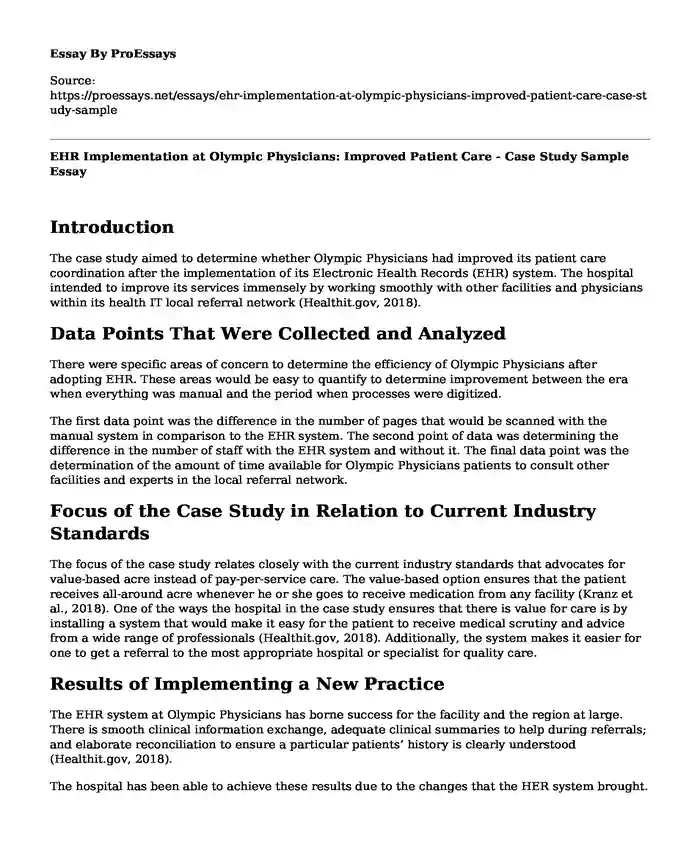Introduction
The case study aimed to determine whether Olympic Physicians had improved its patient care coordination after the implementation of its Electronic Health Records (EHR) system. The hospital intended to improve its services immensely by working smoothly with other facilities and physicians within its health IT local referral network (Healthit.gov, 2018).
Data Points That Were Collected and Analyzed
There were specific areas of concern to determine the efficiency of Olympic Physicians after adopting EHR. These areas would be easy to quantify to determine improvement between the era when everything was manual and the period when processes were digitized.
The first data point was the difference in the number of pages that would be scanned with the manual system in comparison to the EHR system. The second point of data was determining the difference in the number of staff with the EHR system and without it. The final data point was the determination of the amount of time available for Olympic Physicians patients to consult other facilities and experts in the local referral network.
Focus of the Case Study in Relation to Current Industry Standards
The focus of the case study relates closely with the current industry standards that advocates for value-based acre instead of pay-per-service care. The value-based option ensures that the patient receives all-around acre whenever he or she goes to receive medication from any facility (Kranz et al., 2018). One of the ways the hospital in the case study ensures that there is value for care is by installing a system that would make it easy for the patient to receive medical scrutiny and advice from a wide range of professionals (Healthit.gov, 2018). Additionally, the system makes it easier for one to get a referral to the most appropriate hospital or specialist for quality care.
Results of Implementing a New Practice
The EHR system at Olympic Physicians has borne success for the facility and the region at large. There is smooth clinical information exchange, adequate clinical summaries to help during referrals; and elaborate reconciliation to ensure a particular patients’ history is clearly understood (Healthit.gov, 2018).
The hospital has been able to achieve these results due to the changes that the HER system brought. First, the staff used to peruse through about 400 pages of paper records per month (Healthit.gov, 2018). This situation required about 40 full-time equivalents (FTE) of staff time. Fortunately, with the EHR system, this process was automated thus the number of medical health personnel was reduced from 4 FTEs to 1.25FTEs. Also the facility has a 24/7 access to other local providers. In this regard, Olympic Physicians can get Mason General’s ED reports, progress notes, x-rays among other information to help in patient care at any time (Healthit.gov, 2018).
Application of Case Study Practices to My Organization
The case study focuses on improvement in the coordination of care. Coordination is a very crucial exercise in any organization. It is through coordination that teams can work harmoniously to finish tasks in time (Graetz et al., 2014). Therefore, the practices discussed in the cases study will be essential in my organization since we can opt to use information system that connect all the departments. Currently, there is such a system in place but not all stakeholders have been brought on board. The support staff as well as the suppliers need to be introduced on the database with the intention of understanding supplier histories and the changes in their business structures (Tohidi et al., 2017).
Conclusion
Finally, support staff productivity will easily be monitored through such an information system by determining the number of hours they engage in certain tasks. This information will go a long way to avoid overlapping of duties, redundancy and wastage of resources thus improving productivity.
References
Graetz, I., Reed, M., Shortell, S. M., Rundall, T. G., Bellows, J., & Hsu, J. (2014). The association between EHRs and care coordination varies by team cohesion. Health services research, 49(1pt2), 438-452.
Healthit.gov. (2018, November 13). Rural health clinic exchanges information with hospitals and physicians for improved coordination of care | HealthIT.gov. ONC | Office of the National Coordinator for Health Information Technology. Retrieved July 15, 2020, from https://www.healthit.gov/case-study/rural-health-clinic-exchanges-information-hospitals-and-physicians-improved-coordination
Kranz, A. M., Dalton, S., Damberg, C., & Timbie, J. W. (2018). Using health IT to coordinate care and improve quality in safety-net clinics. The Joint Commission Journal on Quality and Patient Safety, 44(12), 731-740.
Tohidi, H., Namdari, A., Keyser, T. K., & Drzymalski, J. (2017). Information sharing systems and teamwork between sub-teams: a mathematical modeling perspective. Journal of Industrial Engineering International, 13(4), 513-520.
Cite this page
EHR Implementation at Olympic Physicians: Improved Patient Care - Case Study Sample. (2023, Oct 10). Retrieved from https://proessays.net/essays/ehr-implementation-at-olympic-physicians-improved-patient-care-case-study-sample
If you are the original author of this essay and no longer wish to have it published on the ProEssays website, please click below to request its removal:
- Patient Tracer Discussion for Nightingale Community Hospital
- Ethics Paper Example on Opioid
- Screening and Early HIV Treatment Paper Example
- How My Mother's Behavior Inspired Me - Essay Sample
- Paper Example on Client BMI 33.8930Kg: Obesity Risk High
- People with Disabilities: The Disability Act of 1990 - Research Paper
- Essay Sample on Mental Health & Acute Care Nursing







